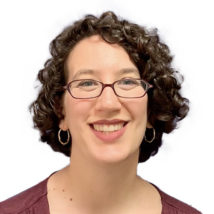
Lisa Grossman
Astronomy Writer, Science News
Lisa Grossman is the astronomy writer for Science News. Previously she was a news editor at New Scientist, where she ran the physical sciences section of the magazine for three years. Before that, she spent three years at New Scientist as a reporter, covering space, physics and astronomy. She has a degree in astronomy from Cornell University and a graduate certificate in science writing from the University of California, Santa Cruz. Lisa was a finalist for the AGU David Perlman Award for Excellence in Science Journalism, and received the Institute of Physics/Science and Technology Facilities Council physics writing award and the AAS Solar Physics Division Popular Writing Award. She interned at Science News in 2009-2010.

All Stories by Lisa Grossman
-
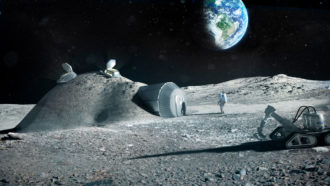 Space
SpaceAstronauts may be able to make cement with their own pee
Lunar dust and a compound found in urine might one day be used to build future dwellings on the moon, a new study finds.
-
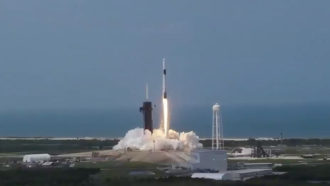 Space
SpaceA first: Commercial rocket takes humans into space
Two NASA astronauts aboard the privately built Crew Dragon capsule are the first to be sent into orbit from U.S. soil since 2011.
-
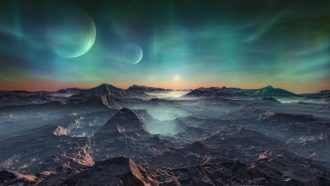 Planets
PlanetsPlanets with hydrogen skies could harbor life
Microbes can live in a hydrogen atmosphere. This points to new space worlds that host alien life.
-
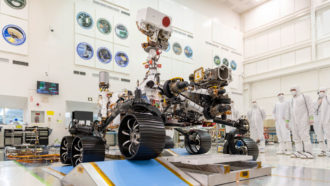
-
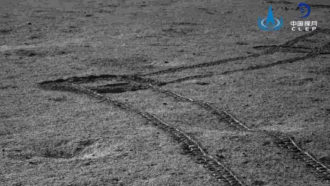 Space
SpaceRover finds ‘layer cake’ below ground on moon’s farside
China’s rover finds the moon’s farside is more rugged and cratered than the nearside. Now scientists want to know why.
-
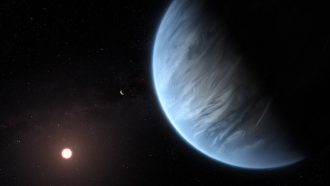 Planets
PlanetsSpotted: An exoplanet where it might rain
A planet outside the solar system appears to have clouds with liquid water.
-
 Planets
PlanetsPhysics Nobel rewards discoveries on cosmic evolution and exoplanets
This trio of scientists helped figure out the makeup of our universe. Two of them also identified the first known exoplanet orbiting a sunlike star.
-
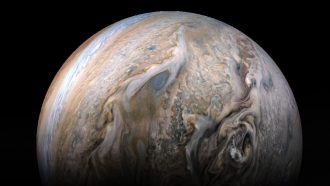 Planets
PlanetsStudents help name 5 of Jupiter’s newly discovered moons
Astronomers announced discovering 12 new moons of Jupiter in July 2018. Five of them now just been named for goddesses and spirits of Greek and Roman mythology.
-
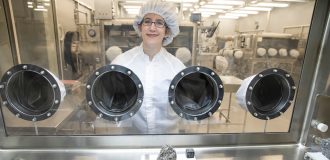 Planets
PlanetsWelcome to moon rock central
A Science News reporter’s visit to NASA’s moon-rock lab shows the hyper-pristine conditions in which these rocks are kept — and why that’s so important.
-
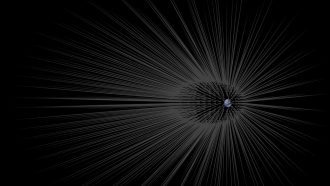 Physics
PhysicsIf dark matter particles could kill us, they would have already
Dark matter is a mysterious substance. The fact that no one has been killed by it suggests it is relatively small and light.
-
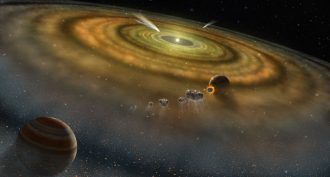 Planets
PlanetsWhat do you call a moon that escapes its planet? A ‘ploonet’
Giant planets in other star systems might lose their moons, creating new planets. And if moons do go rogue, current telescopes may be able to find them.
-
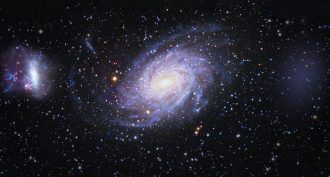 Space
SpaceCaught: A ghost galaxy that may have hit ours long ago
Astronomers think they’ve found a galaxy that hit the Milky Way. The collision took place millions of years ago, leaving ripples in our galaxy.